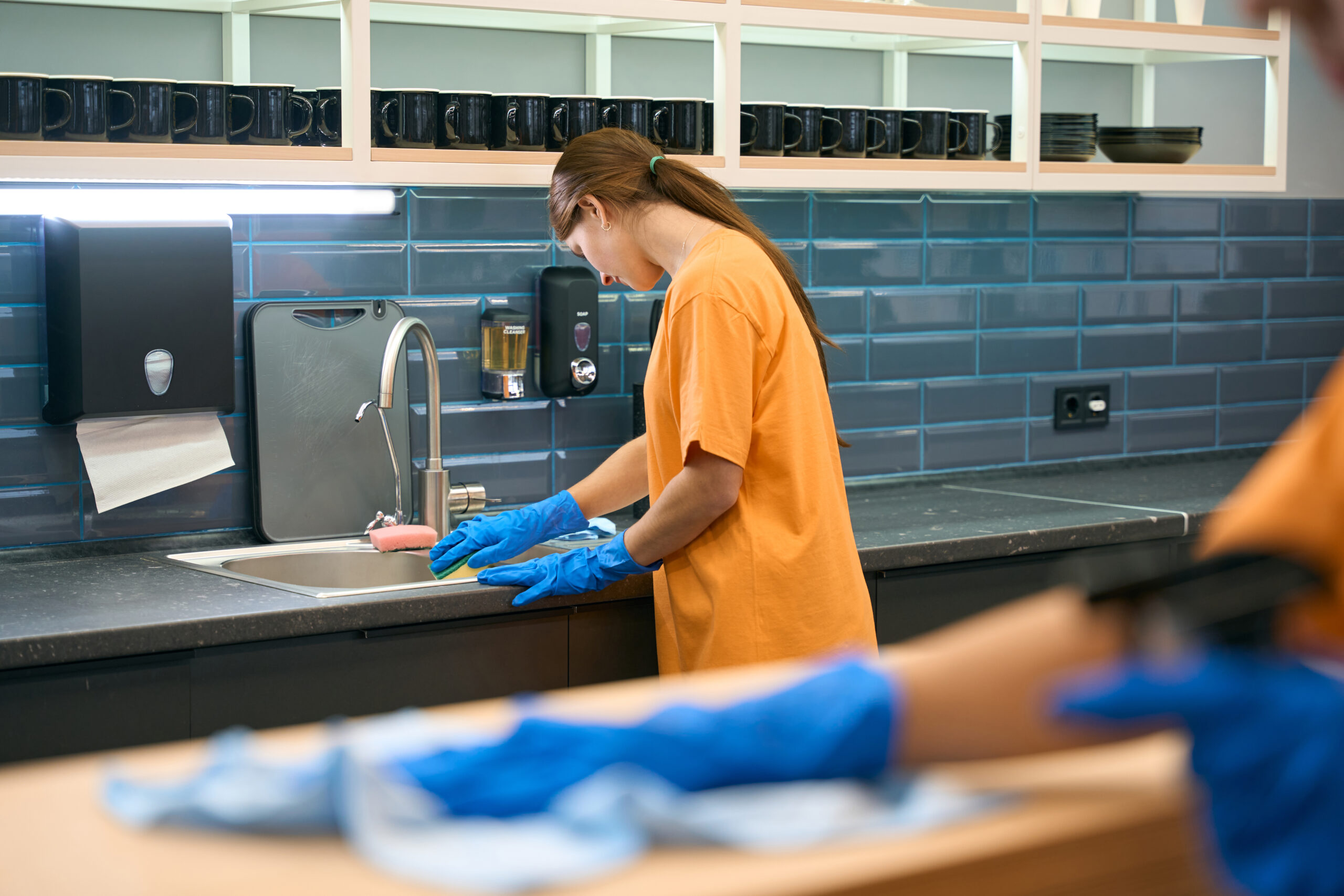A clean office kitchen is essential for maintaining a healthy work environment. Since the office kitchen is a shared space, it can quickly become a breeding ground for germs and bacteria if not properly cleaned. Regular cleaning promotes hygiene and ensures that employees can enjoy their meals in a pleasant setting. A well-maintained kitchen helps reduce odors, prevent pest infestations, and keep the office looking professional.
Daily and weekly cleaning tasks are necessary to keep the kitchen in top condition. Daily cleaning ensures that spills and messes are promptly addressed, while weekly tasks focus on deeper cleaning that maintains the overall cleanliness. Proper waste management and recycling practices also play a critical role in kitchen hygiene, as they prevent the buildup of garbage and recycling items.
Additionally, following some simple tips and practices can help maintain a sanitary office kitchen. From wiping down surfaces to organizing storage areas, a few everyday actions can make a significant difference. So, let’s discuss the essential tasks and tips for office kitchen cleaning, ensuring a healthy and pleasant environment for everyone.
Daily Kitchen Cleaning Tasks
Keeping the office kitchen clean every day helps maintain a healthy and pleasant environment. Here is a list of daily tasks to ensure the kitchen stays clean and organized:
1. Wipe Down Surfaces: Use a disinfectant to wipe down countertops, tables, and any other surfaces. This helps remove food crumbs and spills that can attract pests and harbor germs.
2. Wash Dishes: Encourage employees to wash their dishes immediately after use. Make sure the sink is clear of dirty dishes, and if there’s a dishwasher, run it daily.
3. Empty Trash Bins: Empty the trash bins daily to prevent odors and reduce the risk of pests. Make sure to replace the liners regularly.
4. Clean the Microwave: Spills and splatters inside the microwave can become hard to clean if left for too long. Wipe down the inside of the microwave every day to keep it clean and odor-free.
5. Sweep and Mop the Floor: At the end of the day, sweep and mop the kitchen floor to remove dirt and food particles. This helps in maintaining a clean and safe kitchen environment.
By keeping up with these daily tasks, we ensure that the office kitchen remains a clean and inviting space for everyone.
Weekly Kitchen Cleaning Checklist
In addition to daily tasks, a deeper clean is required weekly to maintain overall hygiene in the office kitchen. Here’s a checklist of weekly cleaning activities:
1. Clean Out the Fridge: Once a week, check the refrigerator for expired food items and leftovers. Remove anything that is no longer fresh, and wipe down the shelves and drawers with a disinfectant.
2. Sanitize the Sink: The sink can be a hotspot for germs. Use a strong disinfectant to thoroughly clean and sanitize the sink, including the faucet and handles.
3. Wipe Down Cabinets and Drawers: Dust and grime can accumulate on cabinet and drawer surfaces. Take time to wipe them down with a damp cloth and disinfectant.
4. Deep Clean Appliances: Clean other kitchen appliances like the coffee maker, toaster, and any other equipment used regularly. Remove and wash any removable parts.
5. Disinfect Handles and Knobs: Door handles, cabinet knobs, and switches are frequently touched and can harbor germs. Use a disinfectant to wipe them down thoroughly.
6. Mop the Floor with a Disinfectant: A weekly mop with a disinfectant solution ensures any lingering germs are eliminated. Pay special attention to corners and under appliances.
Completing these weekly tasks helps keep the office kitchen in top condition, providing a healthier space for everyone to use and enjoy.
Proper Waste Management and Recycling
Proper waste management and recycling are essential for maintaining a clean and eco-friendly office kitchen. This not only keeps the kitchen tidy but also helps reduce the environmental impact of waste.
1. Separate Waste Bins: Provide separate bins for regular trash, recyclables, and compostables. Label each bin clearly to help employees sort their waste correctly. This small step can significantly improve recycling rates and reduce landfill waste.
2. Regular Collection: Ensure that trash and recycling bins are emptied regularly to prevent overflows and unpleasant odors. Set a schedule for waste collection, whether daily or multiple times a week, depending on the usage.
3. Recycling Guidelines: Share clear guidelines on what can and cannot be recycled. Many people are unsure about the rules for recycling, leading to contamination. Post a simple list of recyclable and non-recyclable items in the kitchen area to help everyone make informed choices.
4. Composting: If your office supports composting, provide a compost bin for food scraps. Composting helps reduce waste and can even benefit local gardens or farms. Make sure to compost correctly by avoiding items like meat, dairy, and oily foods, which can attract pests.
Implementing proper waste management and recycling practices plays a critical role in maintaining a clean and sustainable office kitchen.
Tips for Maintaining a Sanitary Office Kitchen
Maintaining a sanitary office kitchen requires everyone’s participation and a few smart habits. Here are some practical tips:
1. Encourage Personal Responsibility: Remind employees to clean up after themselves. Simple actions like wiping up spills, washing their own dishes, and disposing of trash properly help keep the kitchen clean.
2. Keep Cleaning Supplies Handy: Stock the kitchen with essential cleaning supplies, such as disinfectant wipes, sponges, dish soap, and paper towels. Easy access to supplies encourages employees to address messes immediately.
3. Establish a Cleaning Roster: Create a cleaning roster if your office doesn’t have dedicated cleaning staff. Rotate the responsibility among employees to ensure that cleaning tasks are consistently completed.
4. Monitor Food Storage: Label food items stored in the refrigerator with names and dates to avoid forgotten leftovers. Regularly check for expired or spoiled food to maintain a fresh and odor-free fridge.
5. Implement Clear Policies: Develop clear kitchen policies and communicate them to all staff. Policies might include rules about cleaning up, sharing kitchen space, and proper food storage practices.
Mastering Office Kitchen Care
A clean and sanitary office kitchen is essential for the health and well-being of everyone in the workplace. By following daily and weekly cleaning tasks, managing waste and recycling properly, and adopting smart habits, we can create a pleasant and hygienic environment for all. This guide has provided actionable steps that are easy to implement and maintain, ensuring a cleaner and more organized kitchen.
If you want to ensure your office kitchen remains spotless and germ-free, Condor Commercial Clean offers professional cleaning services tailored to commercial spaces in Denver. Contact our commercial cleaning company in Denver today to learn more about how we can help maintain your office kitchen and other areas of your workplace!





